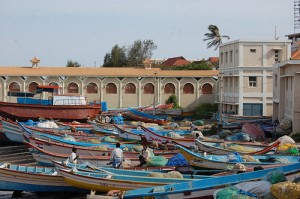‘Fisher folk’ – the warm-hearted term caught my eye as I browsed the titles of the papers from PCF7, the 7th Pan-Commonwealth Forum on Open Learning. The full title of the paper is ‘Enhancing Lives and Livelihoods of Fisher folk through Innovative Technology applications’, though the title on the PDF version uses the term ‘fishermen’. Hmm, is ‘fishermen’ a sexist term that requires correction? Not sure, though I note that the introduction does include ‘fisher folk’ as well as ‘fishermen’ and ‘fishing community’, and ‘fishers’ is is used later in the paper.
 Whatever the case, the paper concerns sections of the Indian fishing community in Tamil Nadu, nearly two-thirds of whom live below the poverty line. Through focussed education and the judicious application of mobile technology related to fishing, the M S Swaminathan Research Foundation (MSSRF) has transformed thousands of lives.
Whatever the case, the paper concerns sections of the Indian fishing community in Tamil Nadu, nearly two-thirds of whom live below the poverty line. Through focussed education and the judicious application of mobile technology related to fishing, the M S Swaminathan Research Foundation (MSSRF) has transformed thousands of lives.
But what do we mean by ‘transform’? This innovative program has made a real difference, measured and quantified in the absorbing paper. It has apparently been an incremental project, with the gradual implementation of a range of technologies to provide information (in Tamil rather than English), for example, about wind speed, wave height, wind direction, cyclone alerts, high wave alerts, swells and potential fishing areas. Under the oversight of Village Resource Centres, the focus has led to critical application of mobile technologies and electronic display boards.
And the outcome? As reported by the authors, Anabel and Eddolin of MSSRF, the benefits included:
(a) navigate to potential fishing zone and catch more fishes (62%)
(b) safety and protection during fishing in sea (53%),
(c) decreased diesel cost – (20%),
(d) repairing faults in GPS within short span and
(e) increased confidence (9%).
To personalise these overall results, the paper includes the following statement from one fisherman: “I was able to haul fish worth Rs 2000, 1700 and 900 respectively on three consecutive days than the normal as I used the PFZ information and reached the spot. This also helped me to save on 500 litres of Diesel as the distance travelled reduced. Thus, I was able to save Rs 25000 on Diesel expenses and gain Rs 60,000 from additional catch”.
Overall this paper presents us in enlightening detail how ODL continues to contribute to development and to transform lives. And it’s one of many similar papers that emerge from conferences such as these. It served to remind me that we need to read such papers, not to advance our thinking about theoretical aspects of ODL, but to remind us of the power of ODL around the globe.
So, go on, check the conference web site and browse the keynotes, plenaries and pictures, but don’t also forget to check the papers: you’ll find some gems.